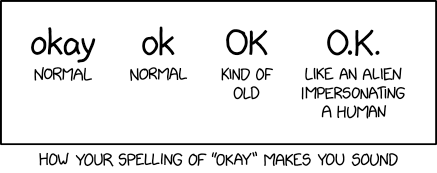OK/okay/ok

After changing it back and forth several times and consulting with internet linguist Gretchen McCulloch, I settled on "ok" in my book How To, but I'm still on the fence. Maybe I should just switch to "oK."

After changing it back and forth several times and consulting with internet linguist Gretchen McCulloch, I settled on "ok" in my book How To, but I'm still on the fence. Maybe I should just switch to "oK."
This comic states how you 'sound' (as the typical narrative voice in your readers' collective heads) based on how you spell the word "OK" in your text. The word "OK", per Wikipedia, "is an American English word denoting approval, acceptance, agreement, assent, acknowledgment, or a sign of indifference." Many etymologies have been proposed to explain its origin. The Oxford English Dictionary and most other modern dictionaries say that it began in 1839 as "O.K.", a fanciful abbreviation for "oll korrect" (all correct).
According to Randall, modern usage is to either have both letters in lowercase "ok", or the expression as a single word, with the sounds spelled phonetically: "okay". Using OK with both capital letters is kind of old, as the expression is almost never thought of as an abbreviation anymore. The original spelling of the word as "O.K." with periods after the letters is less commonly used in modern times, so Randall equates this usage to "an alien impersonating a human". (See for instance the last picture in this comic, 1530: Keyboard Mash for who might use that spelling).
The title text mentions Gretchen McCulloch, a Canadian Internet linguist. She focuses on trends in use of English words in online communications. Randall claims that he consulted with her on the use of "ok" in his book How To and after changing back and forth between different options he settles for "ok". However, he is still unsure which version to use, and claims he is now considering switching to "oK.", a strange spelling that "compromises" between the three abbreviations, having one lowercase letter, one capital letter, and only one period; ending the sentence with an abbreviation with a period inside the quotation marks also makes it uncertain if he means "oK" or "oK." as that can be debated. This was most likely on purpose knowing Randall's love for grammar rule and spelling. It is of course debated in this explanation's discussion.